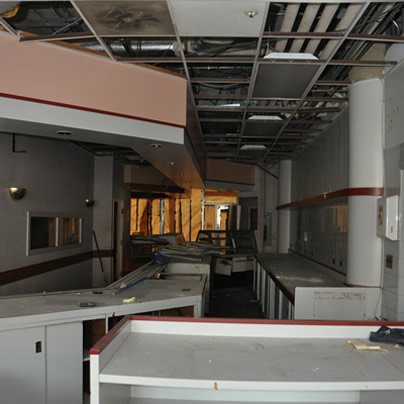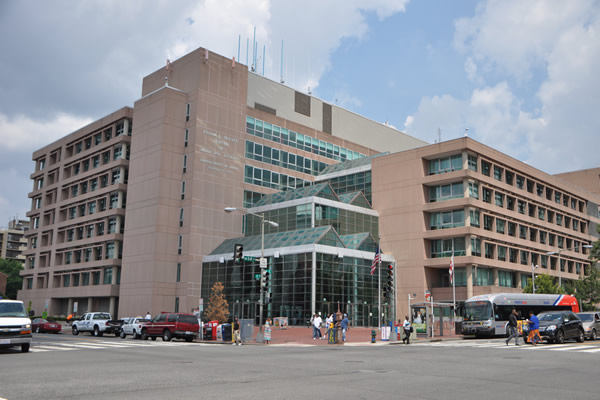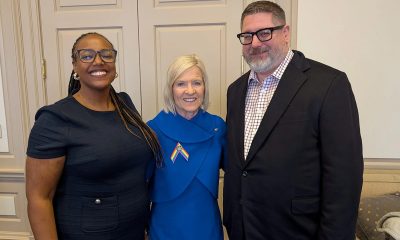Arts & Entertainment
Stadium deal prompts D.C. Center to reconsider move
Mayor promises ‘suitable’ relocation after Reeves building closes

The D.C. Center for the LGBT Community announced late Friday that it has put on hold the renovation of the space into which it planned to move in September in the city’s Reeves Center municipal building following news one day earlier that the building will likely be demolished in three years.
Mayor Vincent Gray and at least three of his top aides said the city would help the D.C. Center find a new location if and when the Reeves building closes.
Gray’s comments came during a news conference on Thursday in which Gray announced that the Reeves building at 14th and U streets, N.W. would be given to a private developer in exchange for land to build a new soccer stadium in the Buzzard Point section of Southwest D.C.
“We are going to make sure they are relocated to a suitable place,” Gray said in response to a question from the Blade.
Gray announced that the land swap was part of a proposed $300 million deal involving the city and D.C. United, the major league soccer team that has long sought to move out of the city’s aging and outdated RFK Stadium.
“Since signing our lease in January of this year, the D.C. Center has expended thousands of volunteer hours and thousands of dollars in renovating the space in the Reeves Center with anticipation of a September move-in date,” Center Board President Michael Sessa said in a July 26 statement.
“Unfortunately, continued renovation of the Reeves Center space will stop effective immediately until we have a better understanding of where the mayor proposes to relocate the D.C. Center,” Sessa said.
The soccer stadium deal and land swap must be approved by City Council. And two other private owners of land needed for the new stadium, including PEPCO, have yet to consent to sell their respective properties.
But Gray and five members of Council who support the deal predicted the remaining obstacles would be overcome because the multi-million dollar project would be of great economic benefit to the city.
Matthew Klein, president of the Akridge development company, which would acquire the Reeves building in the land swap, unveiled an architectural drawing at the news conference of a new building that would be constructed at the site of the Reeves building. The new building is expected to include residential and commercial space.
D.C. Center Executive Director David Mariner noted on Thursday following the mayor’s news conference that the Center’s 15-year lease at the Reeves building requires the Center to spend at least $70,000 to renovate the first-floor, storefront space to get it ready for occupancy.
Mariner said the demolition part of the renovation has been completed through the help of volunteers from the community. With the sudden news that the Center’s stay in the building is likely to be two or three years rather than 15 years or more, Mariner said the Center’s board must decide whether it still makes sense to move into the Reeves building.
“I don’t think we are prepared to invest the time, energy and labor on a massive renovation project if you can’t guarantee that we’ll be there for more than two years,” Mariner told Brian Hanlon, director of the D.C. Department of General Services (DGS) in a conversation following the news conference.
“You mentioned time and money and investment and I think there are ways to incorporate all those things into where we’re going,” Hanlon told Mariner.
Hanlon said one possible way to address the expenses noted by Mariner is for the city to offset them in a new rental agreement at another nearby city-owned building or city-operated building.
Tony Robinson, a spokesperson for the Office of the City Administrator, told the Blade that Gray and other city officials were looking into new rental space for the center at a private building in which a number of city agencies are located at 1250 U St., N.W. The building is two blocks from the Reeves building and one block from the D.C. Center’s current space at 1318 U St., N.W.
The Center had to look for a new location after an unrelated development project required that it vacate its current U Street space.
“What I’m saying is the DGS, the mayor, the government is committed to making sure you all find a home in Ward 1,” Hanlon told Mariner. “It’s my understanding that that’s the epicenter of the community that you serve. So we’re committed to working that through.”
Sessa told the Blade earlier in the day on Friday that Center officials will be meeting next week with Gray’s chief of staff Christopher Murphy and possibly others from the mayor’s office to discuss the Center’s options.
“Of course that’s under review,” said Sessa when asked if the Center was considering dropping plans to move into the Reeves building. “Everything is under review. But what action we take has to be based on our discussion with the city, which hasn’t happened yet.”
In the Center’s statement released later in the day on Friday Sessa said, “We have requested a meeting [with city officials] immediately as we are scheduled to vacate our current space within less than 60 days. We look forward to hearing the mayor’s plans and working with the city to ensure a permanent home for the LGBTQ community.”
Fate of gay nightclub unclear

Ziegfeld’s/Secrets (Washington Blade file photo by Michael Key)
Robinson of the City Administrator’s office told the Blade the soccer stadium proposal calls for building a hotel and other businesses such as restaurants and shops near the site of the new stadium.
The gay nightclub Ziegfeld’s/Secrets is located in that area at 1824 Half St., S.W., which is outside the footprint of the soccer stadium but within the area for the ancillary development.
Robinson said the property owners of buildings and land outside the stadium footprint are free to decline to sell to developers and remain in the area as long as they wish.
“There are no plans to do eminent domain for anything except what’s in the footprint of the site [of the stadium],” he said. “There are no plans to close any other facility.”
However, Ziegfeld’s/Secrets currently rents its space in a building owned by Denver businessman Marty Chernoff, who owned and operated the former gay nightclub Tracks in a warehouse building that has since been demolished to make way for an office building.
Chernoff told the Blade that he has known Ziegfeld’s/Secrets principal owner Allen Carroll for a long time and will give Carroll the first right to buy the building if and when Chernoff decides to sell it. He said at least one real estate broker representing a developer has approached him to buy the building.
“I want to make it completely clear that I am not the one forcing him out,” Chernoff said. “So if he chooses to do something because of whatever economic pressure there is or something like that, that would be his choice.”
Carroll couldn’t immediately be reached for comment.
Gay and Lesbian Activists Alliance President Rick Rosendall said LGBT community advocates called on the city to help Ziegfeld’s/Secrets find another suitable location when it was displaced in 2006 by construction of the Washington Nationals Baseball Stadium.
The baseball stadium development forced Ziegfeld’s/Secrets, which features drag shows and male nude dancers, and four other gay clubs to move from the unit block of O Street, S.E., where they had been located for close to 30 years.
Rosendall said GLAA would urge the city to assist Ziegfeld’s/Secrets to find a suitable new home if the club is displaced yet again by development triggered by the proposed soccer stadium.
Photos
PHOTOS: Montgomery County Pride in the Plaza
LGBTQ celebration held in downtown Silver Spring

Montgomery County Pride in the Plaza was held on Sunday, June 29 at Veterans Plaza in Silver Spring, Md.
(Washington Blade photos by Michael Key)























The fifth annual Fredericksburg Pride march and festival was held on Saturday, June 28. A march through the streets of downtown Fredericksburg, Va. was followed by a festival at Riverfront Park.
(Washington Blade photos by Michael Key)



















India
Anaya Bangar challenges ban on trans women in female cricket teams
Former Indian cricketer Sanjay Bangar’s daughter has received support

Anaya Bangar, the daughter of former Indian cricketer Sanjay Bangar, has partnered with the Manchester Metropolitan University Institute of Sport in the U.K. to assess her physiological profile following her gender-affirming surgery and undergoing hormone replacement therapy.
From January to March 2025, the 23-year-old underwent an eight-week research project that measured her glucose levels, oxygen uptake, muscle mass, strength, and endurance after extensive training.
The results, shared via Instagram, revealed her metrics align with those of cisgender female athletes, positioning her as eligible for women’s cricket under current scientific standards. Bangar’s findings challenge the International Cricket Council’s 2023 ban on transgender athletes in women’s cricket, prompting her to call for a science-based dialogue with the Board of Control for Cricket in India and the ICC to reform policies for transgender inclusion.
“I am talking with scientific evidence in my hand,” Bangar said in an interview posted to her Instagram page. “So, I hope, this makes an impact and I will be hoping to BCCI and ICC talking with me and discussing this further.”
On Nov. 21, 2023, the ICC enacted a controversial policy barring trans women from international women’s cricket. Finalized after a board meeting in Ahmedabad, India, the regulation prohibits any trans player who has experienced male puberty from competing, irrespective of gender-affirming surgery or hormone therapy. Developed through a 9-month consultation led by the ICC’s Medical Advisory Committee, the rule aims to safeguard the “integrity, safety, and fairness” of women’s cricket but has drawn criticism for excluding athletes like Canada’s Danielle McGahey, the first trans woman to play internationally. The policy, which allows domestic boards to set their own rules, is slated for review by November 2025.
Bangar shared a document on social media verifying her participation in a physiological study at the Manchester Metropolitan University Institute of Sport, conducted from Jan. 20 to March 3, 2025, focused on cricket performance. The report confirmed that her vital metrics — including haemoglobin, blood glucose, peak power, and mean power — aligned with those of cisgender female athletes. Initially, her fasting blood glucose measured 6.1 mmol/L, slightly above the typical non-diabetic range of 4.0–5.9 mmol/L, but subsequent tests showed it normalized, reinforcing the study’s findings that her physical profile meets female athletic standards.
“I am submitting this to the BCCI and ICC, with full transparency and hope,” said Bangar. “My only intention is to start a conversation based on facts not fear. To build space, not divide it.”
In a letter to the BCCI and the ICC, Bangar emphasized her test results from the Manchester Metropolitan University study. She explained that the research aimed to assess how hormone therapy had influenced her strength, stamina, haemoglobin, glucose levels, and overall performance, benchmarked directly against cisgender female athletic standards.
Bangar’s letter to the BCCI and the ICC clarified the Manchester study was not intended as a political statement but as a catalyst for a science-driven dialogue on fairness and inclusion in cricket. She emphasized the importance of prioritizing empirical data over assumptions to shape equitable policies for trans athletes in the sport.
Bangar urged the BCCI, the world’s most influential cricket authority, to initiate a formal dialogue on trans women’s inclusion in women’s cricket, rooted in medical science, performance metrics, and ethical fairness. She called for the exploration of eligibility pathways based on sport-specific criteria, such as haemoglobin thresholds, testosterone suppression timelines, and standardized performance testing. Additionally, she advocated for collaboration with experts, athletes, and legal advisors to develop policies that balance inclusivity with competitive integrity.
“I am releasing my report and story publicly not for sympathy, but for truth. Because inclusion does not mean ignoring fairness, it means measuring it, transparently and responsibly,” said Bangar in a letter to the BCCI. “I would deeply appreciate the opportunity to meet with you or a representative of the BCCI or ICC to present my findings, discuss possible policy pathways, and work towards a future where every athlete is evaluated based on real data, not outdated perceptions.”
Before her transition, Bangar competed for Islam Gymkhana in Mumbai and Hinckley Cricket Club in the U.K., showcasing her talent in domestic cricket circuits. Her father, Sanjay Bangar, was a dependable all-rounder for the Indian national cricket team from 2001 to 2004, playing 12 test matches and 15 One Day Internationals. He later served as a batting coach for the Indian team from 2014 to 2019, contributing to its strategic development.
Cricket in India is a cultural phenomenon, commanding a fanbase of more than 1 billion, with more than 80 percent of global cricket viewership originating from the country.
The International Cricket Council, the sport’s governing body, oversees 12 full member nations and more than 90 associate members, with the U.S. recently gaining associate member status in 2019 and co-hosting the 2024 ICC Men’s T20 World Cup. The BCCI generated approximately $2.25 billion in revenue in the 2023–24 financial year, primarily from the Indian Premier League, bilateral series, and ICC revenue sharing. The ICC earns over $3 billion from media rights in India alone for the 2024–27 cycle, contributing nearly 90 percent of its global media rights revenue, with the BCCI receiving 38.5 percent of the ICC’s annual earnings, approximately $231 million per year.
Women’s cricket in India enjoys a growing fanbase, with over 300 million viewers for the Women’s Premier League in 2024, making it a significant driver of the sport’s global popularity. The International Cricket Council oversees women’s cricket in 12 full member nations and over 90 associate members, with the U.S. fielding a women’s team since gaining associate status in 2019 and competing in ICC events like the 2024 Women’s T20 World Cup qualifiers. The BCCI invests heavily in women’s cricket, allocating approximately $60 million annually to the WPL and domestic programs in 2024–25, while contributing to the ICC’s $20 million budget for women’s cricket development globally. India’s media market for women’s cricket, including WPL broadcasting rights, generated $120 million in 2024, accounting for over 50 percent of the ICC’s women’s cricket media revenue.
“As a woman, I feel when someone says that they are women, then they are, be trans or cis. A trans woman is definitely the same as a cis woman emotionally and in vitals, and specially, when someone is on hormone replacement therapy. Stopping Anaya Bangar from playing is discrimination and violation of her rights. It is really sad and painful that every transwoman need to fight and prove their identity everywhere,” said Indrani Chakraborty, an LGBTQ rights activist and a mother of a trans woman. “If ICC and BCCI is stopping her from playing for being transgender, then I will say this to be their lack of awareness and of course the social mindsets which deny acceptance.”
Chakraborty told the Blade that Bangar is an asset, no matter what. She said that the women’s cricket team will only benefit by participation, but the discriminating policies are the hindrance.
“Actually the transgender community face such discrimination in every sphere. In spite of being potent, they face rejection. This is highly inhuman. These attitudes is regressive and will never let to prosper. Are we really in 2025?,” said Chakraborty. “We, our mindset and the society are the issues. We, as a whole, need to get aware and have to come together for getting justice for Anaya. If today, we remain silent, the entire community will be oppressed. Proper knowledge of gender issues need to be understood.”
The BCCI and the International Cricket Council have not responded to the Blade’s repeated requests for comment.
-

 U.S. Supreme Court5 days ago
U.S. Supreme Court5 days agoSupreme Court upholds ACA rule that makes PrEP, other preventative care free
-

 U.S. Supreme Court5 days ago
U.S. Supreme Court5 days agoSupreme Court rules parents must have option to opt children out of LGBTQ-specific lessons
-

 Television5 days ago
Television5 days ago‘White Lotus,’ ‘Severance,’ ‘Andor’ lead Dorian TV Awards noms
-

 Music & Concerts5 days ago
Music & Concerts5 days agoBerkshire Choral to commemorate Matthew Shepard’s life













